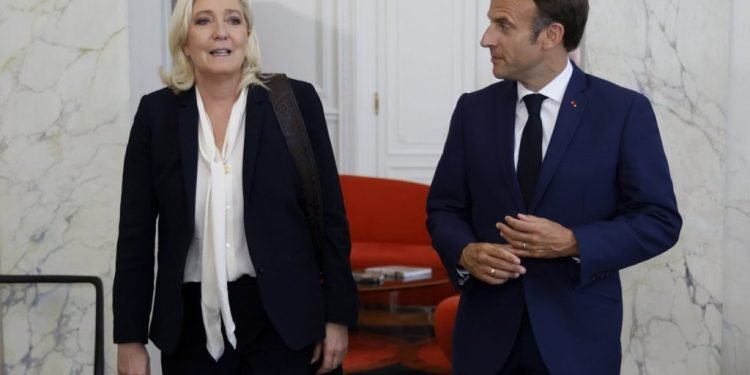French voters delivered a verdict, but the final outcome remains uncertain. The first round of the parliamentary elections concluded on Sunday, with a strong showing by the far-right National Rally (RN) party led by Marine Le Pen. However, incumbent President Emmanuel Macron’s centrist coalition Together! managed to secure enough seats to remain in power, albeit with a significantly weakened majority. A tense second round on July 7th will determine the final composition of the National Assembly and the future direction of French politics.
A Surge for Le Pen, a Wake-Up Call for Macron:
- RN’s Rise: The National Rally, capitalizing on frustrations with immigration, economic inequality, and Macron’s perceived elitism, saw a significant increase in support compared to the 2017 elections.
- Macron’s Gamble Backfires: Macron’s decision to call a snap election after his party’s losses in the European Parliament elections appears to have backfired, potentially leading to a hung parliament and a period of political instability.
- Fractured Landscape: The traditional center-left and center-right parties suffered heavy losses, further fragmenting the French political landscape.
Macron’s Agenda on the Line:
- Weakened Majority: Macron’s ability to enact his domestic agenda, including pension reform and tax cuts, will depend on his ability to either secure a stronger majority in the second round or forge alliances with other parties.
- Coalition Calculus: The coming days will see intense negotiations as Macron seeks to cobble together a workable coalition, potentially with center-left or center-right parties.
- Political Gridlock Risk: A hung parliament could lead to a period of political gridlock, hindering Macron’s ability to govern effectively.
Second Round: A Battle for Influence:
- Turnout Crucial: The second round is often characterized by lower voter turnout, which could benefit either side.
- Strategic Voting: Voters from other parties might strategically cast ballots to block the RN from gaining a significant share of seats.
- Uncertain Outcome: The final makeup of the National Assembly remains uncertain, with the potential for a variety of coalition scenarios.
France’s Future at Stake:
The outcome of the election will have significant implications for France’s future:
- Immigration Policy: The rise of the RN raises concerns about a potential shift towards stricter immigration policies.
- European Partnership: Macron’s vision for a stronger European Union could be challenged by a more Eurosceptic parliament.
- Economic Outlook: Political instability could negatively impact France’s economic recovery from the pandemic.
A Pivotal Moment:
France’s parliamentary election marks a pivotal moment in the country’s recent political history. The coming days will be crucial in determining whether Macron can maintain his grip on power and navigate a more fragmented political landscape. The world will be watching closely as France chooses its path forward.























